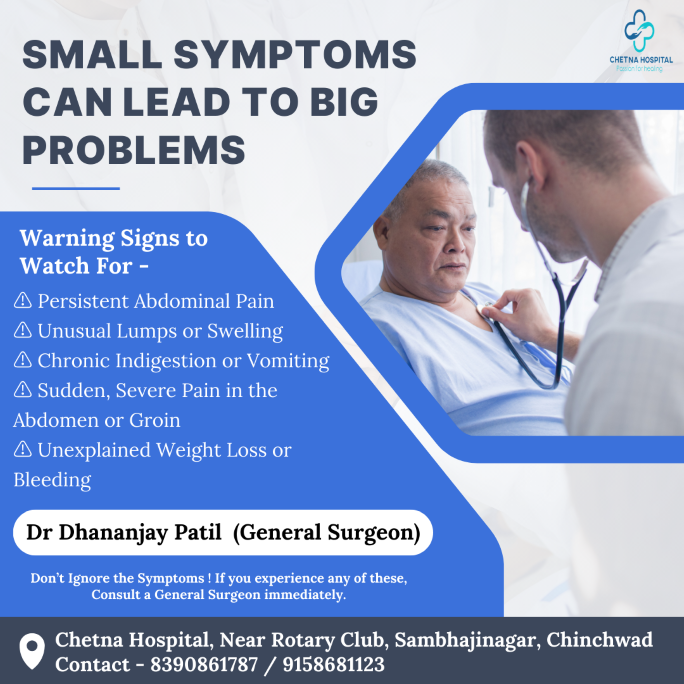Introduction
Early diagnosis plays a crucial role in managing and treating surgical conditions effectively. Many surgical diseases, such as appendicitis, hernias, gallstones, tumors, and intestinal obstructions, can worsen if left undiagnosed or untreated for too long. Early detection allows for timely intervention, reducing complications, hospital stays, and even mortality rates.
In this blog, we will explore the importance of early diagnosis in surgical conditions, its benefits, common signs to watch for, and how regular check-ups can help prevent serious health issues.
Why Early Diagnosis Matters
- Prevents Disease Progression Many surgical conditions start with mild symptoms that can be easily managed if caught early. For example, a small hernia may be repaired with a minor surgical procedure, but if left untreated, it can lead to complications such as bowel obstruction or strangulation, requiring emergency surgery.
- Reduces Risk of Complications Delay in diagnosis can result in severe complications. Take appendicitis as an example. If diagnosed early, a simple appendectomy can resolve the condition. However, if ignored, the appendix may rupture, leading to peritonitis (infection of the abdominal cavity), which is a life-threatening emergency.
- Allows for Minimally Invasive Surgery When a condition is detected early, it can often be treated with laparoscopic or minimally invasive techniques rather than open surgery. Minimally invasive procedures lead to:
- Smaller incisions
- Less postoperative pain
- Faster recovery times
- Lower risk of infections
- Reduces Healthcare Costs Early diagnosis often means lower treatment costs because complications and extended hospital stays are avoided. Emergency surgeries tend to be more expensive than planned, elective procedures.
- Improves Patient Outcomes The earlier a condition is diagnosed, the better the outcome. Early intervention can save lives in cases like cancer, gallbladder disease, and gastrointestinal obstructions. When a disease is caught early, patients experience better recovery rates and improved quality of life.
Common Surgical Conditions That Benefit from Early Diagnosis
- Appendicitis – A sudden pain in the lower right abdomen should not be ignored. If treated early, a laparoscopic appendectomy can resolve the issue quickly. A delayed diagnosis, however, can lead to a ruptured appendix and severe infections.
- Hernias – A bulge in the abdomen or groin might seem minor but can worsen over time. Early diagnosis and surgery can prevent painful complications like strangulation.
- Gallstones – Symptoms like upper abdominal pain, nausea, and vomiting could indicate gallstones. If treated early, a laparoscopic cholecystectomy (gallbladder removal) can be performed before severe inflammation occurs.
- Intestinal Obstructions – Bloating, severe cramps, and vomiting might indicate bowel obstruction. Early intervention prevents bowel necrosis (tissue death), which requires more complex surgery.
- Tumors & Cancers – Whether benign or malignant, early detection of tumors significantly improves the chances of successful treatment.
Warning Signs That Require Immediate Medical Attention
Recognizing early symptoms of surgical conditions can prevent emergencies. Look out for:
- Persistent abdominal pain that worsens over time
- Unexplained lumps or swelling anywhere in the body
- Chronic indigestion or vomiting after meals
- Unusual bleeding (vomiting blood, blood in stool, or heavy menstrual bleeding)
- Sudden weight loss without any changes in diet or activity
- Fever with severe pain in the abdomen or groin
- Difficulty swallowing or breathing
Ignoring these signs can delay treatment, leading to serious health risks.
The Role of Diagnostic Tools in Early Detection
Advancements in medical technology have made it easier to detect surgical conditions early. Some of the most commonly used diagnostic tests include:
- Ultrasound (USG) – Helps detect gallstones, hernias, and tumors.
- X-rays – Useful for diagnosing fractures, intestinal obstructions, and lung infections.
- CT Scan & MRI – Provide detailed imaging of internal organs, helping to detect tumors and complex conditions.
- Endoscopy & Colonoscopy – Used for detecting gastrointestinal conditions, ulcers, and early signs of colon cancer.
- Blood Tests – Help identify infections, inflammation, and other underlying health conditions that may require surgical intervention.
Regular health check-ups, especially for individuals with a family history of surgical conditions, can help detect potential issues before they become severe.
Preventive Measures to Avoid Severe Surgical Conditions
- Routine Medical Check-Ups Visiting a doctor for regular health screenings can help detect conditions before symptoms become severe.
- Healthy Diet & Lifestyle
- Maintaining a balanced diet can prevent conditions like gallstones and acid reflux.
- Regular exercise strengthens the body and prevents obesity-related issues like hernias.
- Avoid smoking and excessive alcohol consumption, as they contribute to serious gastrointestinal conditions.
- Being Aware of Family History If surgical conditions run in your family, you should be more vigilant and undergo regular screenings.
- Seeking Medical Attention at the First Sign of Symptoms If you notice any unusual symptoms, do not delay in consulting a doctor. Early intervention is key to effective treatment.
Conclusion
Early diagnosis is a life-saving measure in the management of surgical conditions. It allows for effective treatment, lowers the risk of complications, and improves patient recovery. Being aware of warning signs and seeking timely medical attention can make a significant difference in surgical outcomes and overall health.
At Chetna Multispeciality Hospital, we emphasize early detection and treatment to ensure the best possible care for our patients. If you or a loved one are experiencing symptoms that may require surgical attention, do not wait—schedule a consultation today!
For Consultation Contact us on 8390861787 / 9158681123
Website – www.chetnahospital.co.in
Address – Chetna Hospital, Sambhajinagar, MIDC, G Block, Near Rotary Club, Chinchwad 411019
.
.
.
#pune#pcmc#chinchwad#hospital#medical#medicalservices#health#healthcare#surgery#generalsurgery#medicalprocedure#generalsurgeon#generalsurgeoninchinchwad













